Other stories — fictions as well as legends based in truth — shape our languages and our ways of thinking, our imaginations and, yes, the stories we add to humanity’s opus. Every story we tell is, in a sense, a new entry in an ongoing dialogue among storytellers that goes back generations.
During one of the several writing panels I spoke on this past weekend at JordanCon, my fellow panelists and I painted a fairly bleak picture of the current state of the market for writers. Falling advances, shrinking publicity budgets, purges of editors at various publishing houses — the litany of alarming trends goes on and on. Contracting with a big-name New York publisher is becoming ever more difficult, leaving aspiring writers with fewer options outside of self-publishing, which remains a hard road for authors who don’t already have a prominent social media presence. And even for more established writers, myself included, small press publishing has become the more attractive and realistic option.
All of this means less money and more work, almost regardless of how much visibility and experience an author might have.
Which begs the question, why keep at it?
This is a question I have asked myself often over the course of a career that has seen its share of ups and downs. I am sure I have even addressed the issue in one way or another on this blog. But I feel the answer bears repeating.
I keep writing because I love to tell stories, and I still have ideas for novels and short fiction that speed my pulse and light my creative vision. I love to give voice to the myriad characters in my imagination who clamor for my attention. I love world building, discovering new places in which to set my narratives, building exciting histories (yes, I’m a history geek, and, for me, “exciting histories” is NOT an oxymoron . . .) constructing cool magic systems. I love it all. Stop writing? I might as well stop thinking.
More than that, though, storytelling is, to my mind, central to who we are as humans. Every holiday we celebrate, secular or faith-based, comes with a story. And when we share those tales of achievement, or triumph, or spiritualism with our children, we pass to them our shared values, our customs, our beliefs. Societies and cultures define themselves with their stories.
Other stories — fictions as well as legends based in truth — shape our languages and our ways of thinking, our imaginations and, yes, the stories we add to humanity’s opus. Every story we tell is, in a sense, a new entry in an ongoing dialogue among storytellers that goes back generations.
Depending upon who you ask, there are really only twenty types of stories. Or seven. Or three. And regardless of what number you agree with, I suppose there might be some truth to this notion. Stories can be categorized if the listing parameters are drawn loosely enough. Another way to look at it is that every story is different and there are as many stories as there are storytellers and ideas. I edit anthologies, and I have seen authors — literally hundreds of them — take a single theme and each create something utterly unique.
Three basic stories, or billions of them? I can go either way. But I believe with all my heart that every writer is engaged in that dialogue I mentioned a moment ago. Stories are embedded in culture, which in turn shapes each new story, which then informs the next generation of creators. Which suggests that we who write are engaged in an undertaking of near cosmic proportion, one that dwarfs the individual.
So is that why we write?
Maybe.
Or maybe we write because we’re writers and what else are we going to do with our days? Maybe we write because as hard as it might be, it’s still a way to make a living.
From the sublime to the ridiculous. Yes, ridiculous. Don’t believe me? You should see my most recently royalty statement . . . [Rimshot]
I come back to how I began. I write because writing is what I love to do. I am profoundly grateful and unbelievably fortunate to have a spouse who loves me and supports me in all ways imaginable. And thus I am able to make a career of my passion. It is not always easy. I have, on more than one occasion over the past quarter century, considered giving up.
But for better or worse, this is what I do, what all of us writers do. And the eternal dialogue awaits our next entries.
Keep writing.









 When I am not in these panels, I will be at my table in Author’s Alley, signing and selling books. I also plan to have with me some of
When I am not in these panels, I will be at my table in Author’s Alley, signing and selling books. I also plan to have with me some of 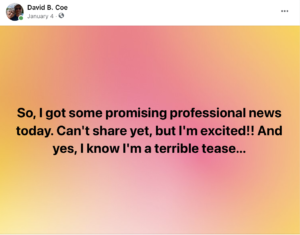 Nearly two months ago, early in the new year, I posted on social media that I had some exciting professional news I couldn’t share quite yet. I was thrilled, and wanted to let people know. But I also didn’t want to say anything before all the details had been settled. So I posted my little teaser, forgetting the one immutable rule of the publishing business: Things always happen slower than one thinks they will.
Nearly two months ago, early in the new year, I posted on social media that I had some exciting professional news I couldn’t share quite yet. I was thrilled, and wanted to let people know. But I also didn’t want to say anything before all the details had been settled. So I posted my little teaser, forgetting the one immutable rule of the publishing business: Things always happen slower than one thinks they will.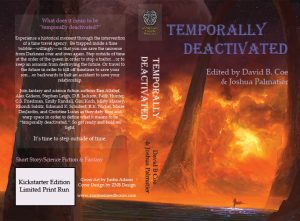 Since writing it, though, I have become sort of fixated on the idea. I am editing my fourth anthology, and already looking at the possibility of editing another. My freelance editing business is attracting a steady stream of clients — I’m booked through the spring and have had inquiries for slots later in the year.
Since writing it, though, I have become sort of fixated on the idea. I am editing my fourth anthology, and already looking at the possibility of editing another. My freelance editing business is attracting a steady stream of clients — I’m booked through the spring and have had inquiries for slots later in the year.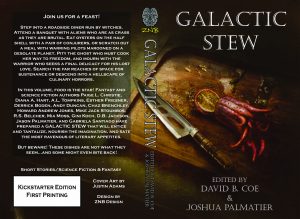 I am not an acquiring editor. I do decide, along with my co-editor, whose stories will be in the anthologies I edit, so I suppose in that way I am determining the fate of submissions and, in a sense, “buying” manuscripts. But, for now at least, I don’t make decisions about the fate of novels, and so I don’t have to go toe-to-toe with agents. Good thing. They scare me. (Looking at you, Lucienne Diver.)
I am not an acquiring editor. I do decide, along with my co-editor, whose stories will be in the anthologies I edit, so I suppose in that way I am determining the fate of submissions and, in a sense, “buying” manuscripts. But, for now at least, I don’t make decisions about the fate of novels, and so I don’t have to go toe-to-toe with agents. Good thing. They scare me. (Looking at you, Lucienne Diver.)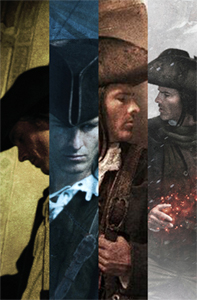 I am not the most talented writer I know. Not by a long shot. I am good. I believe that. My character work is strong. My world building is imaginative. My prose is clean and tight and it flows nicely. I write convincing, effective dialogue and I have a fine eye for detail. My plotting and pacing, which were once just okay, have gotten stronger over the years. I think writing the Thieftaker books — being forced to blend my fictional plots with real historical events — forced me to improve, and that improvement has shown up in the narratives of the Islevale and Radiants books.
I am not the most talented writer I know. Not by a long shot. I am good. I believe that. My character work is strong. My world building is imaginative. My prose is clean and tight and it flows nicely. I write convincing, effective dialogue and I have a fine eye for detail. My plotting and pacing, which were once just okay, have gotten stronger over the years. I think writing the Thieftaker books — being forced to blend my fictional plots with real historical events — forced me to improve, and that improvement has shown up in the narratives of the Islevale and Radiants books.
 8. You read
8. You read  The Outlanders, my second book, may well be the most significant of all the books I’ve published. I knew I had it in me to write one book. But when I finished The Outlanders, and realized it was even better than CofA, I knew I was more than a guy who could write a novel. I was an author. And when Children of Amarid and The Outlanders together were given the Crawford Fantasy Award by the IAFA (International Association for the Fantastic in the Arts), for best fantasy by a new writer, I knew I would have a professional career beyond that first series.
The Outlanders, my second book, may well be the most significant of all the books I’ve published. I knew I had it in me to write one book. But when I finished The Outlanders, and realized it was even better than CofA, I knew I was more than a guy who could write a novel. I was an author. And when Children of Amarid and The Outlanders together were given the Crawford Fantasy Award by the IAFA (International Association for the Fantastic in the Arts), for best fantasy by a new writer, I knew I would have a professional career beyond that first series.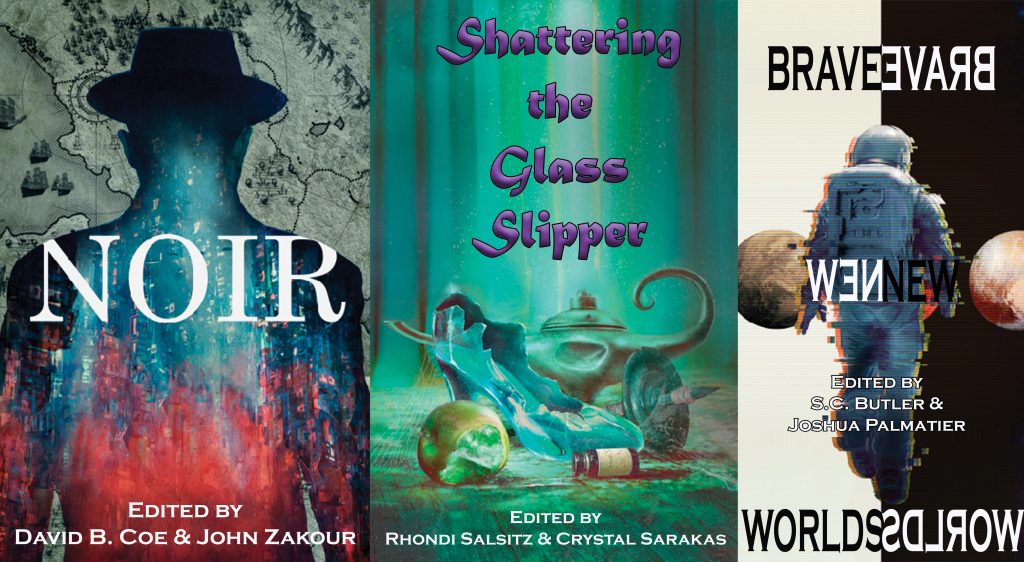 As many of you know, I am once again co-editing an anthology for
As many of you know, I am once again co-editing an anthology for  I did just that. I started with some short stories that have never since seen the light of day, but which helped me to shape the contours of my world and its history. Then I began work on the novel, and by September had completed the first five chapters of what would eventually be Children of Amarid, my first published novel. I gave the manuscript to a friend of the family who had been a publisher, and he agreed to act as my agent, operating under standard agenting fees. He sent those five chapters and an outline of the rest of the book to various fantasy publishers.
I did just that. I started with some short stories that have never since seen the light of day, but which helped me to shape the contours of my world and its history. Then I began work on the novel, and by September had completed the first five chapters of what would eventually be Children of Amarid, my first published novel. I gave the manuscript to a friend of the family who had been a publisher, and he agreed to act as my agent, operating under standard agenting fees. He sent those five chapters and an outline of the rest of the book to various fantasy publishers.